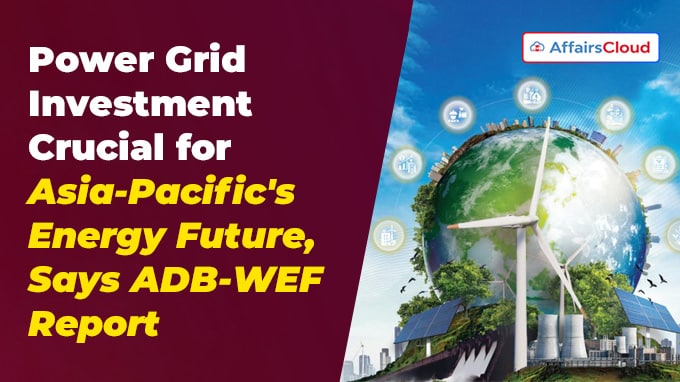 On April 28, 2025, the Manila (Philippines) based Asian Development Bank (ADB), in collaboration with the Cologny (Switzerland) based World Economic Forum (WEF), released the “Energy Transition Readiness Assessment (ETRA) for Developing Asia and the Pacific” report.
On April 28, 2025, the Manila (Philippines) based Asian Development Bank (ADB), in collaboration with the Cologny (Switzerland) based World Economic Forum (WEF), released the “Energy Transition Readiness Assessment (ETRA) for Developing Asia and the Pacific” report.
- It is the ADB’s first initiative to assess the capacity of regional countries to transform their energy systems, utilizing a new readiness framework based on the WEF’s Energy Transition Index(ETI).
- This report underscores the critical need for substantial investments in modernizing and interconnecting power grids across developing countries in Asia and the Pacific to fully harness the benefits of the energy transition.
Key Findings:
1.Regional Progress in Clean Energy Investment:
i.Clean energy investments in developing Asia surged by over 900% from 2013 to 2023, reaching USD 729.4 billion in 2023. This accounts for 45% of global clean energy investments.
ii.The People’s Republic of China (PRC) dominated with 90% of regional investments during 2013–2023, but India, Kazakhstan, Bangladesh, Indonesia, Malaysia, Thailand, Vietnam, the Philippines, and Pakistan achieved more than 75% Renewable Energy(RE) share in new capacity additions in 2022.
iii.Developing Asia is projected to drive two-thirds of global energy growth by 2040, necessitating USD1.4 trillion annually in clean energy investments until 2050 to meet net-zero targets.
2.Challenges in Grid Modernization and Funding:
i.Digitalized grid infrastructure is vital to integrate renewables, but developing Asia faces a USD 23 billion annual gap in concessional funds (2026–2030) to mobilize USD300 billion/year in private financing.
ii.Transition finance remains concentrated, with the PRC securing 89% of regional investments (2013–2023). Other nations, including Association of Southeast Asian Nations (ASEAN) members, struggle with funding shortages.
3.Financial Requirements:
i.Green bonds, sustainability-linked bonds, and transition loans surged from USD 70 billion (2020) to USD 295 billion (2022) in developing Asia, with 89% private-sector participation in 2022.
ii.The Washington, D.C., the United States of America (USA) based International Finance Corporation (IFC) estimates that USD 23 billion/year in concessional funds is needed for India, ASEAN, and other Emerging Markets and Developing Economies (EMDEs) to unlock private capital.
4.Policy and Regulatory Developments:
i.Georgia, Malaysia, and Thailand have strengthened regulatory frameworks to accelerate clean energy transitions.
ii.The Government of India (GoI) launched the National Green Hydrogen Mission (NGHM) in January 2023, allocating USD2.41 billion to achieve 5 million metric tons per annum (MMTPA) production by 2030. Demand is projected to rise 2.5 to 3.5 times by 2040.
- ADB and the New Delhi (Delhi) based International Solar Alliance (ISA) are supporting a Green Hydrogen Innovation Centre to scale technologies.
Note: In June 2025, the ADB will host the 20th Asian Clean Energy Forum in Manila, Philippines.
About Asian Development Bank (ADB):
President – Masato Kanda (Japan)
Headquarters – Mandaluyong City, Manila, Philippines
Founded – 1966
Members – 69




